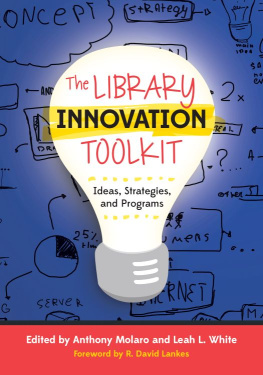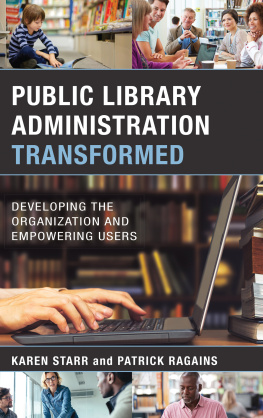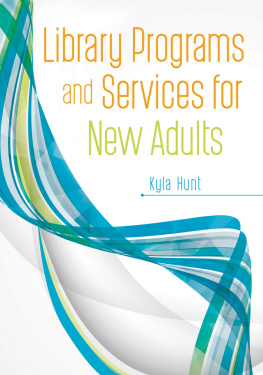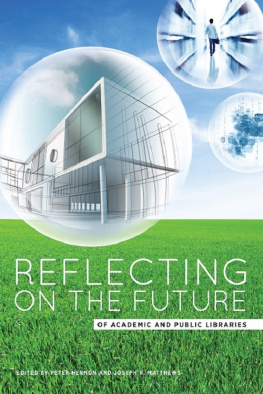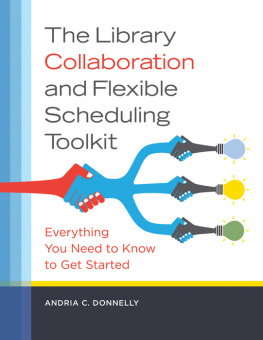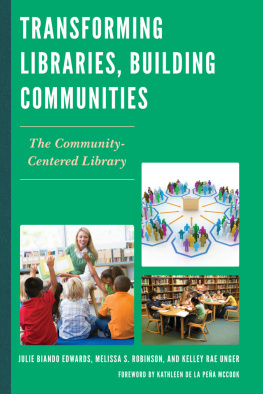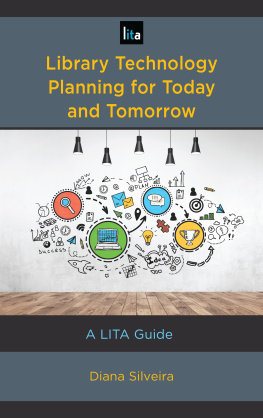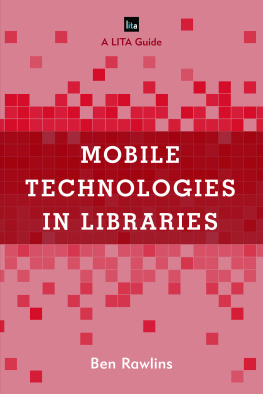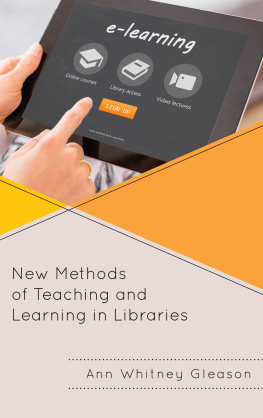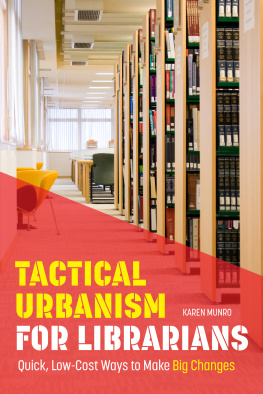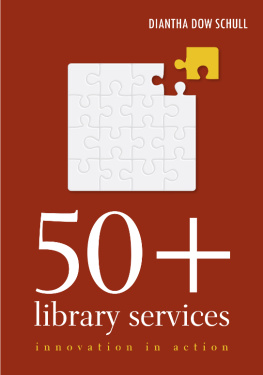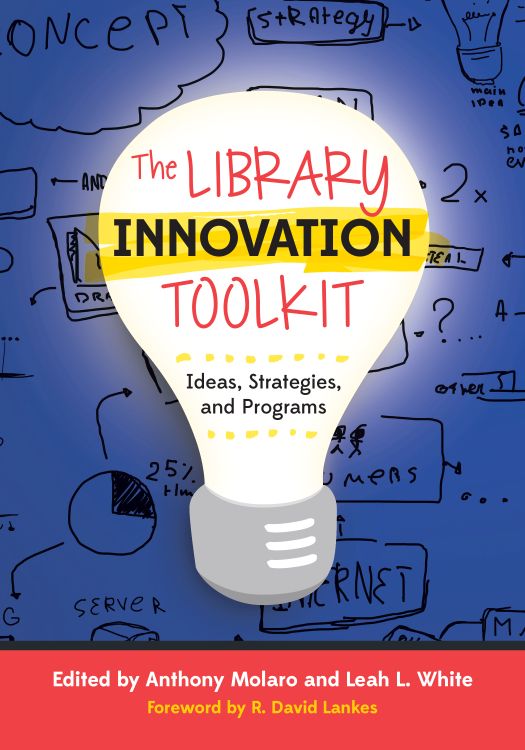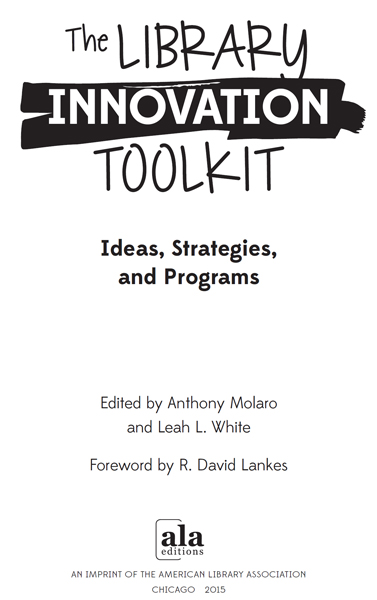Lorna E. Rourke
Sarah Strahl and Erica J. Christianson
Robin Bergart and M. J. DElia
Tracy M. Hall, Edward F. Lener, and Purdom Lindblad
Troy A. Swanson
R. David Lankes
Nothing is different, but everythings changed.
P AUL S IMON AND B RIAN E NO
O NCE U PON A T IME T HERE W AS AN O CEAN
I recently took a family vacation to Walt Disney World. There, in the Magic Kingdoms Tomorrowland is a ride called the Carousel of Progress. It is a rotating stage show that follows an animatronic family as it copes with progress (mostly technological advancements) at the turn of the twentieth century, in the 1920s, 1940s, and sort of today (more like the 1990s). The theme throughout each tableau is the same: look how far weve come; we live in a great era of innovation.
What is interesting about the ride/show is that each era makes a claim that its time is the era of great progress and innovation. Look, indoor plumbinghow could it get any better? Look, electricitysurely we are living in the greatest time of advancement. Look, a stove that is voice activatedtheres a great big beautiful tomorrow.... It is a trap that we all often fall into when we describe innovation and advancements in our own era. It is a narrative that we adopt and is clear throughout this book: this is a time of great change and, in implication, the era of greatest change.
My point is not to challenge this conceptit is clear we are in a time of great changebut rather to say that it is a narrative we adopt, and often from previous generations. We are, as a society and as a field, addicted to innovation. Those who talk about librarianship as a risk-averse, slow-moving field have not been paying attention. Adoption of social networking and makerspaces has come on the heels of adoption of virtual reference, which came upon adoption of the Internet itself, after the adoption of the personal computer, after the adoption of microfiche. Michael Gorman once referred to the library as the graveyard of abandoned technologies.
True innovation is not simply change that matches this larger societal meme of progress for progresss sake. True innovation is positive change, and when you assign terms like positive or negative, you must have some standard to measure it against. Positive for whom? Compared to what? At what cost? As Walt Disneys script calls out the miracles of electricity and cars, he does not talk about (nor was he likely aware of) the environmental impact of pollution and greenhouse gases. He talks about commuting and the rise of suburbs without mentioning the ensuing urban blight.
So, how can we look, not just at change, but at innovationpositive change? I believe the answer is put succinctly by Hashemi Scott and McNamee in of this book: Libraries serve communities, and communities change.
I might add that libraries are part of those served communities as well. As the condition of communities improves, so should the condition of the libraries and librarians. My point is that it is the community that must be our yardstick and arbiter for good and badnot the collection (making it bigger, making it circulate more, making it better described), but the community and the communitys ability to fulfill its needs and aspirations. And, as Hashemi Scott and McNamee note, these needs and aspirations change, and so must libraries and librarianschange, not to fit a narrative, but to improve their communities and society as a whole.
This book adds to the conversation around innovation and change going on in librarianship but also, and more important, at the interface between librarians and communities. I see each chapter as a sort of case study. These cases serve as necessary reality to more conceptual discussions on innovation and the predominant narrative that innovation is good because change is good. These chapters, however, call out for the next step, the next turn of the conversation: making cases transferrable and assessable across libraries and, indeed, across domains.
So, I have a request of you, dear reader. As you read this book and you spark upon a good idea, first, do the good idea. Second, reach out to the author behind that idea. Every project I have ever embarked upon improved by sharing. This book is one side of a conversation; add the other side. Link these ideas into your practice, but also deeper concepts and theories. Use these ideas, these points, these work plans as a foundation for a larger personal network of innovation.
To steal from Walt Disneys song: there is a great big beautiful tomorrow shining for libraries and librarians. That tomorrow will come from a coordinated effort to network as professionals, and to include our communities as part of the library, not simply as consumers of ideas we dream up.
TONYS ACKNOWLEDGMENTS
I wish to thank Lori Donovan, my graduate assistant, who helped me immensely with formatting the following chapters into Chicago style. I also wish to extend my endless gratitude to Leah White, who has been a steadfast partner-in-library-crime with me over the years. I admire your work and continuously look up to you. I also want to thank the faculty, administration, staff, and students of St. Catherine University, MLIS Program, who challenge me, inspire me, and teach me each and every day. Last, I want to thank Erika Molaro, who has been so patient with me while I read, write, edit, and get into projects way over my head.
LEAHS ACKNOWLEDGMENTS
Few projects happen in a vacuum, and I would like to first thank Dr. Anthony Molaro for being my partner throughout the years on several massive and successful projects... more massive than we often realized. Its hard to find someone who is both a friend and a good partner. Youre the tops, Dr. Molaro. I would also like to thank Stefan Moorehead, my partner in life, who keeps me grounded, focused, reading, and also laughing. Finally, a big thank-you to my mentors over the past few years, including Dr. Michael Stephens, Audrey Chapuis, Natalya Fishman, and Eric Robbins, who have all in some way taught me to live and breathe libraries, think creatively, and never give up.

